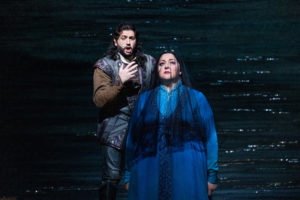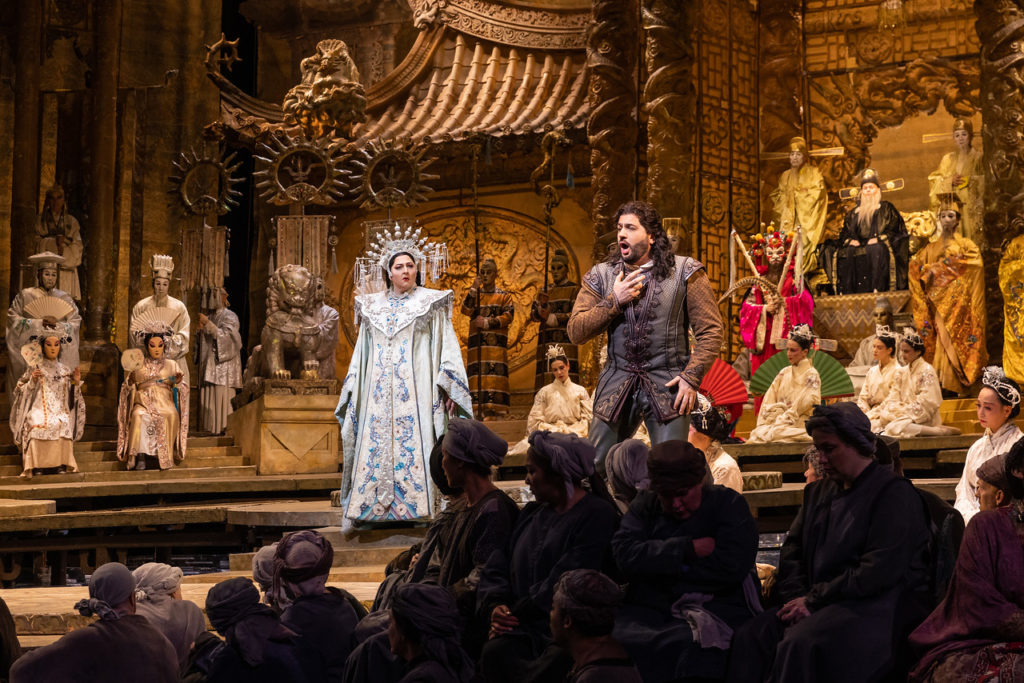
Metropolitan Opera 2021-22 Review: Turandot
Christine Goerke, Michelle Bradley, Yusif Eyvazov Lead Compelling Performance of Puccini Classic
By Logan Martell(Credit: Evan Zimmerman)
On Nov. 2, 2021 the Metropolitan Opera presented the sixth performance of this season’s production of Puccini’s classic “Turandot.”
Zeffirelli’s 1987 production continues to delight audiences with its sumptuous and immersive set. Tuesday’s show saw the opera’s leading roles reprised by Christine Goerke and Yusif Eyvazov, with artists and orchestra under the baton of conductor Marco Armiliato.
Captivating Leads
In the role of Calaf, Eyvazov was in fine form and made a highly-convincing showing as the wayward prince. The deep concern he bore for Liù and his father, and his outrage to see another prince executed, soon melted away after gazing upon Turandot, with Eyvazof putting great emotion into the third cry of her name. As he made his challenge, Eyvazof finely sustained another of these cries while ringing the gong, keeping his support through the large striking motions.
His rendition of the classic tenor showcase “Nessun Dorma” saw him use a thoughtful inflection as he surveyed the restless kingdom around him, before his passion pulled him back and carried him through the following sections. Building towards the conclusion, Eyvazof hit the climactic note with both power and certainty, drawing large applause from the audience only halfway through its delivery. While not having the fullest sound at times, he nonetheless gave an effective performance through his commitment to Calaf’s dramatic circumstances.
In the title role, Goerke excelled through her captivating vocality and nuanced interpretation. Through her rendition of “In questa reggia” her voice carried with dire yet reverent tones which soon swelled into a thing of power as she outlined the tragedy of her ancestor. While Goerke’s timbre was well-suited for the aggrieved and dramatic nature of the number, her delivery struck me as one almost afraid of her own power as she tried to dissuade Calaf from attempting the riddles; this sentiment finely supported her later falling in love with the prince and kept it from feeling too sudden when the inevitable happened and Turandot revealed more of her own heart.
This sense of unraveling was also encapsulated as she posed each riddle, going from a certain, almost stoic quality to one much more vulnerable. This was visually reinforced through her disrobing of royal attire, as well as Calaf managing to finally lay a hand on her when he caught her sleeve, and clearly heard as her desperate cries sounded through the dense ensemble texture. Goerke wonderfully navigated the extremes between Turandot’s crueler, regal nature, and her passionate humanity; these disparities were joyously reconciled in her final line: “His name is love!”

Credit: Evan Zimmerman
As Liù, Michelle Bradley was consistently touching; while her role placed her often on the sidelines until her demise in Act three, her presence and influence could be felt from her earliest lines.
Bradley’s fuller soprano proved soft and flexible as she explained to Calaf the source of her infatuation, capping it off with a plush leap for the line “and you smiled.” Her aria “Tu che di gel sei cinta,” put these qualities on display as Bradley illuminated the sections, her voice rich with love and resolve before she finally took her own life.
While Bradley expertly conveyed the sweet and gentle nature of Liu, there were moments where her dramatic timbre resembled that of Goerke’s, and I could not help but find myself interested in the hypotheticals of how Bradley would fare as the princess Turandot. Her performance that night made a compelling case for Bradley being fit for more prominent roles.
The roles of Ping, Pang, and Pong were portrayed by Alexey Lavrov, Tony Stevenson, and Eric Ferring, respectively. As the court’s three highest officials apart from the princess and emperor, their time on stage shared much of the kingdom’s emotional state. Their trio which opens Act two saw them open with a blithe but uncommitted approach as they readied for either a wedding or a funeral; this soon melted into a more profound sentiment as they reflected on the princess’ vengeful streak and their own desire for peace and simplicity of their respective homes.
COVID’s Continued Challenges
With so much of the drama unfolding in highly-public settings, the stage was often filled with the ensemble of choristers and dancers, either in disarray over their shared empire’s plight, or bolstering the words and actions of the court. One visible aspect missing was the lack of children on stage, due to the restrictions regarding COVID-19 and vaccinations for those under 12. While not seen, their voices instead could be heard joining the choral texture from offstage, and serving as something of a reminder that the difficulties in staging performances caused by the pandemic have yet to be fully resolved.
Regardless, there was much for audiences to enjoy about Tuesday’s performance. Between the compelling cast of established and upcoming artists, and the timelessly gorgeous nature of Zefirelli’s production, the audience had no shortage of applause for the unfolding work, and it is no surprise to see why this opera and production remain as a reliable card in the Metropolitan Opera’s repertory.



